Case Study: Environmental Accounting Impact on Shell's Performance
VerifiedAdded on 2023/06/11
|43
|9276
|63
Case Study
AI Summary
This case study investigates the impact of environmental accounting on the organizational performance of Shell Petroleum Development Company in Oman. It begins with a literature review, exploring conceptual frameworks like stakeholder, legitimacy, and positive accounting theories, and defines environmental accounting, its objectives, benefits, and basic elements. The study analyzes environmental accounting practices, differentiating between cash and accrual accounting methods, and identifies the users of environmental information. Data analysis and discussion sections present the findings, while the conclusion offers recommendations for Shell and suggests areas for future research, acknowledging the study's limitations. The study aims to provide insights into how environmental accounting practices influence organizational performance within the context of Shell's operations in Oman.
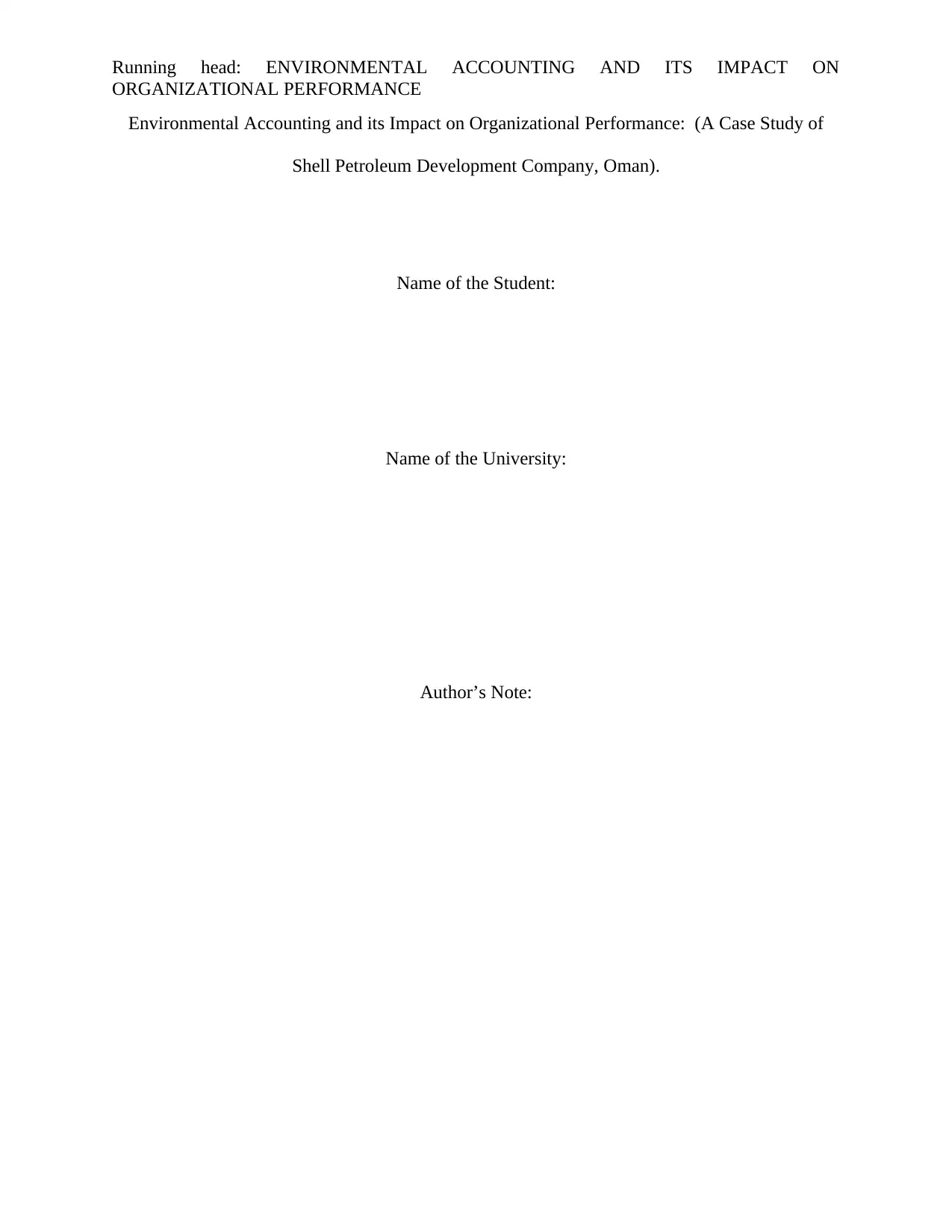
Running head: ENVIRONMENTAL ACCOUNTING AND ITS IMPACT ON
ORGANIZATIONAL PERFORMANCE
Environmental Accounting and its Impact on Organizational Performance: (A Case Study of
Shell Petroleum Development Company, Oman).
Name of the Student:
Name of the University:
Author’s Note:
ORGANIZATIONAL PERFORMANCE
Environmental Accounting and its Impact on Organizational Performance: (A Case Study of
Shell Petroleum Development Company, Oman).
Name of the Student:
Name of the University:
Author’s Note:
Paraphrase This Document
Need a fresh take? Get an instant paraphrase of this document with our AI Paraphraser
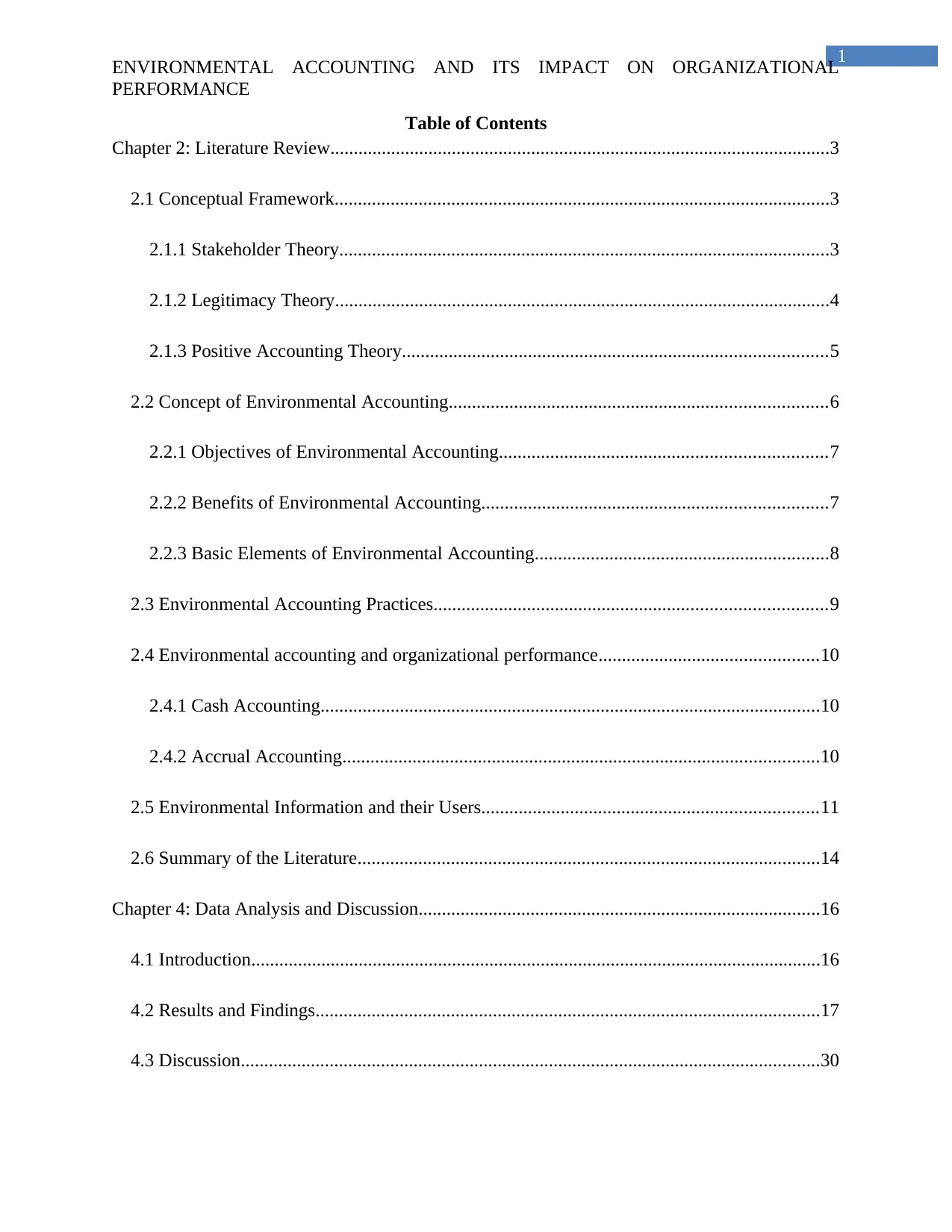
1
ENVIRONMENTAL ACCOUNTING AND ITS IMPACT ON ORGANIZATIONAL
PERFORMANCE
Table of Contents
Chapter 2: Literature Review...........................................................................................................3
2.1 Conceptual Framework..........................................................................................................3
2.1.1 Stakeholder Theory.........................................................................................................3
2.1.2 Legitimacy Theory..........................................................................................................4
2.1.3 Positive Accounting Theory...........................................................................................5
2.2 Concept of Environmental Accounting.................................................................................6
2.2.1 Objectives of Environmental Accounting......................................................................7
2.2.2 Benefits of Environmental Accounting..........................................................................7
2.2.3 Basic Elements of Environmental Accounting...............................................................8
2.3 Environmental Accounting Practices....................................................................................9
2.4 Environmental accounting and organizational performance...............................................10
2.4.1 Cash Accounting...........................................................................................................10
2.4.2 Accrual Accounting......................................................................................................10
2.5 Environmental Information and their Users........................................................................11
2.6 Summary of the Literature...................................................................................................14
Chapter 4: Data Analysis and Discussion......................................................................................16
4.1 Introduction..........................................................................................................................16
4.2 Results and Findings............................................................................................................17
4.3 Discussion............................................................................................................................30
ENVIRONMENTAL ACCOUNTING AND ITS IMPACT ON ORGANIZATIONAL
PERFORMANCE
Table of Contents
Chapter 2: Literature Review...........................................................................................................3
2.1 Conceptual Framework..........................................................................................................3
2.1.1 Stakeholder Theory.........................................................................................................3
2.1.2 Legitimacy Theory..........................................................................................................4
2.1.3 Positive Accounting Theory...........................................................................................5
2.2 Concept of Environmental Accounting.................................................................................6
2.2.1 Objectives of Environmental Accounting......................................................................7
2.2.2 Benefits of Environmental Accounting..........................................................................7
2.2.3 Basic Elements of Environmental Accounting...............................................................8
2.3 Environmental Accounting Practices....................................................................................9
2.4 Environmental accounting and organizational performance...............................................10
2.4.1 Cash Accounting...........................................................................................................10
2.4.2 Accrual Accounting......................................................................................................10
2.5 Environmental Information and their Users........................................................................11
2.6 Summary of the Literature...................................................................................................14
Chapter 4: Data Analysis and Discussion......................................................................................16
4.1 Introduction..........................................................................................................................16
4.2 Results and Findings............................................................................................................17
4.3 Discussion............................................................................................................................30
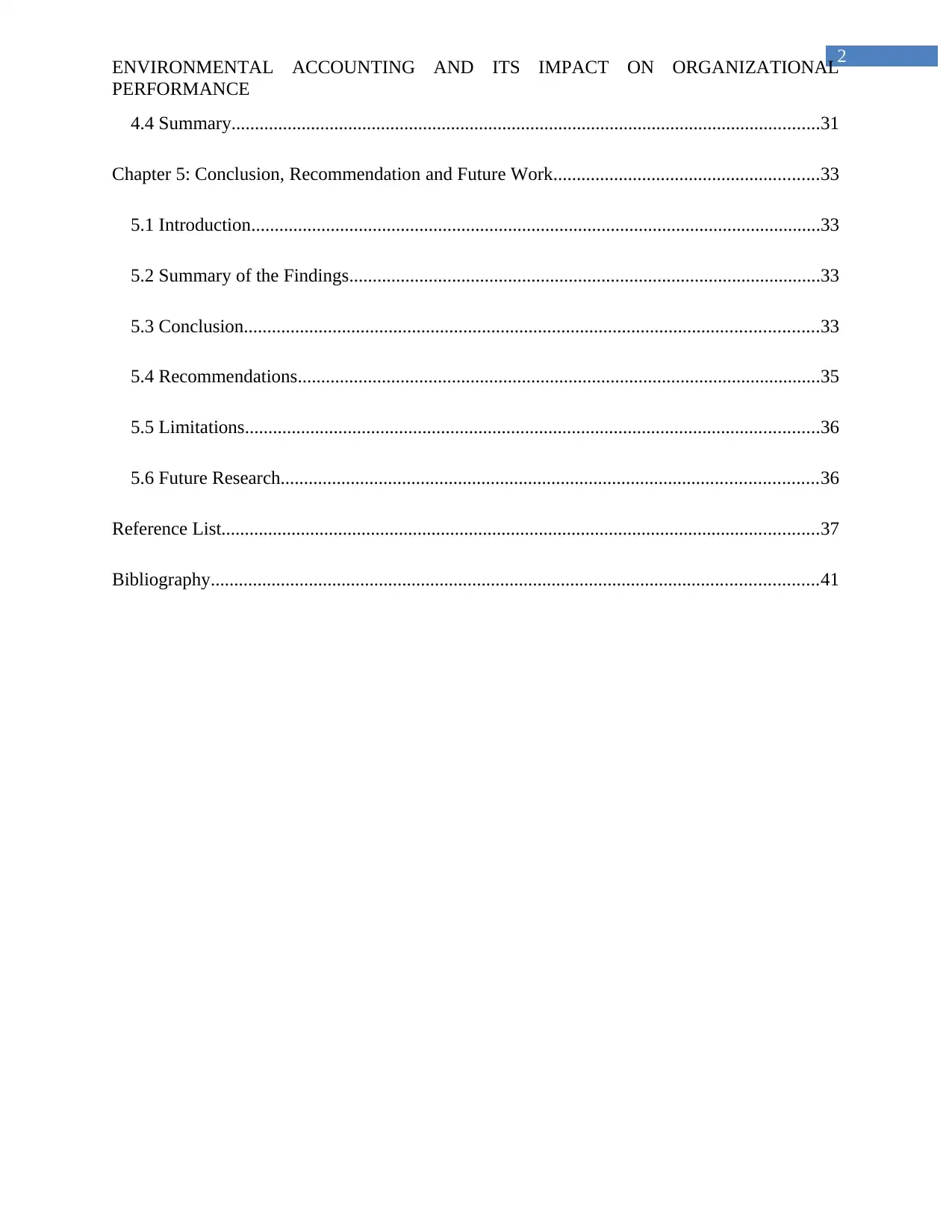
2
ENVIRONMENTAL ACCOUNTING AND ITS IMPACT ON ORGANIZATIONAL
PERFORMANCE
4.4 Summary..............................................................................................................................31
Chapter 5: Conclusion, Recommendation and Future Work.........................................................33
5.1 Introduction..........................................................................................................................33
5.2 Summary of the Findings.....................................................................................................33
5.3 Conclusion...........................................................................................................................33
5.4 Recommendations................................................................................................................35
5.5 Limitations...........................................................................................................................36
5.6 Future Research...................................................................................................................36
Reference List................................................................................................................................37
Bibliography..................................................................................................................................41
ENVIRONMENTAL ACCOUNTING AND ITS IMPACT ON ORGANIZATIONAL
PERFORMANCE
4.4 Summary..............................................................................................................................31
Chapter 5: Conclusion, Recommendation and Future Work.........................................................33
5.1 Introduction..........................................................................................................................33
5.2 Summary of the Findings.....................................................................................................33
5.3 Conclusion...........................................................................................................................33
5.4 Recommendations................................................................................................................35
5.5 Limitations...........................................................................................................................36
5.6 Future Research...................................................................................................................36
Reference List................................................................................................................................37
Bibliography..................................................................................................................................41
⊘ This is a preview!⊘
Do you want full access?
Subscribe today to unlock all pages.

Trusted by 1+ million students worldwide
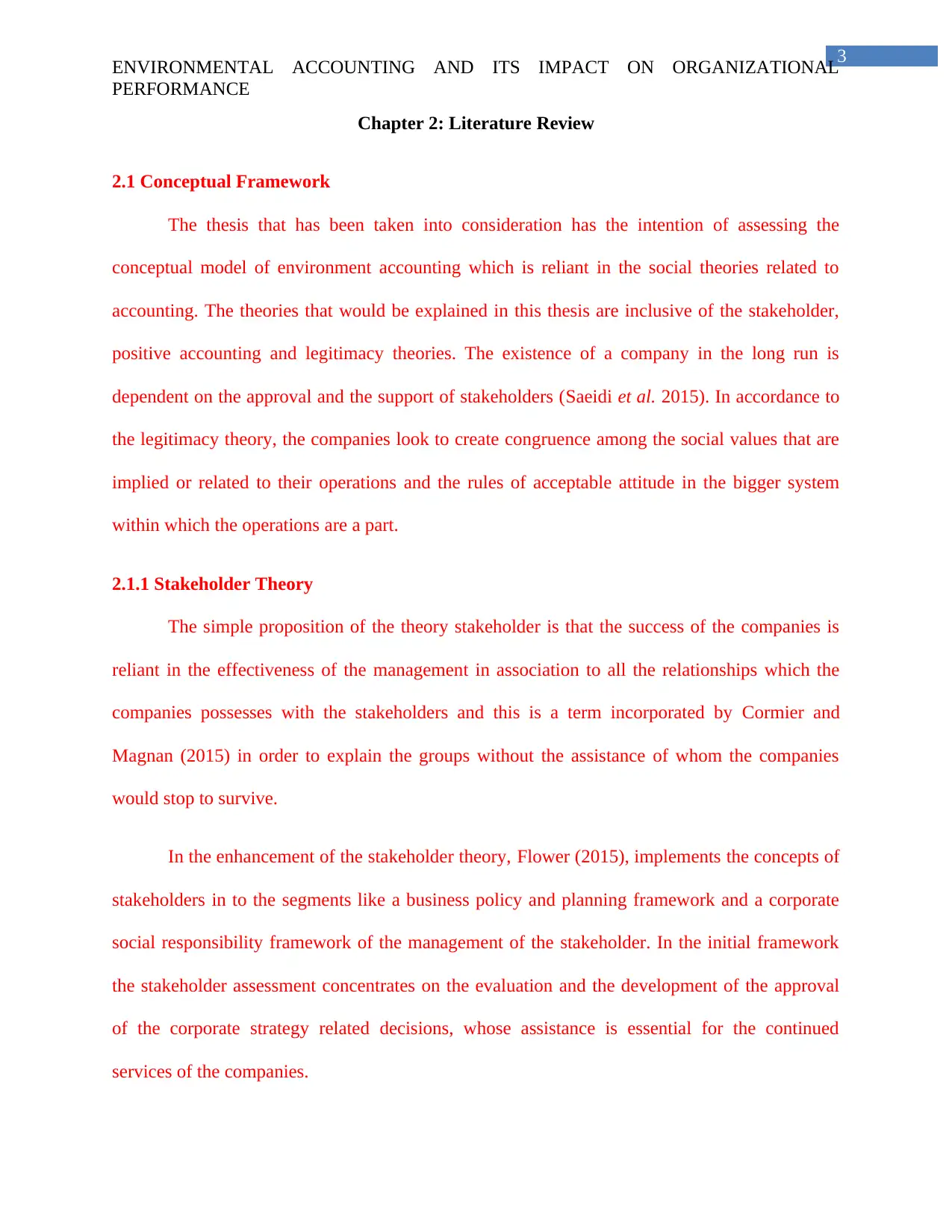
3
ENVIRONMENTAL ACCOUNTING AND ITS IMPACT ON ORGANIZATIONAL
PERFORMANCE
Chapter 2: Literature Review
2.1 Conceptual Framework
The thesis that has been taken into consideration has the intention of assessing the
conceptual model of environment accounting which is reliant in the social theories related to
accounting. The theories that would be explained in this thesis are inclusive of the stakeholder,
positive accounting and legitimacy theories. The existence of a company in the long run is
dependent on the approval and the support of stakeholders (Saeidi et al. 2015). In accordance to
the legitimacy theory, the companies look to create congruence among the social values that are
implied or related to their operations and the rules of acceptable attitude in the bigger system
within which the operations are a part.
2.1.1 Stakeholder Theory
The simple proposition of the theory stakeholder is that the success of the companies is
reliant in the effectiveness of the management in association to all the relationships which the
companies possesses with the stakeholders and this is a term incorporated by Cormier and
Magnan (2015) in order to explain the groups without the assistance of whom the companies
would stop to survive.
In the enhancement of the stakeholder theory, Flower (2015), implements the concepts of
stakeholders in to the segments like a business policy and planning framework and a corporate
social responsibility framework of the management of the stakeholder. In the initial framework
the stakeholder assessment concentrates on the evaluation and the development of the approval
of the corporate strategy related decisions, whose assistance is essential for the continued
services of the companies.
ENVIRONMENTAL ACCOUNTING AND ITS IMPACT ON ORGANIZATIONAL
PERFORMANCE
Chapter 2: Literature Review
2.1 Conceptual Framework
The thesis that has been taken into consideration has the intention of assessing the
conceptual model of environment accounting which is reliant in the social theories related to
accounting. The theories that would be explained in this thesis are inclusive of the stakeholder,
positive accounting and legitimacy theories. The existence of a company in the long run is
dependent on the approval and the support of stakeholders (Saeidi et al. 2015). In accordance to
the legitimacy theory, the companies look to create congruence among the social values that are
implied or related to their operations and the rules of acceptable attitude in the bigger system
within which the operations are a part.
2.1.1 Stakeholder Theory
The simple proposition of the theory stakeholder is that the success of the companies is
reliant in the effectiveness of the management in association to all the relationships which the
companies possesses with the stakeholders and this is a term incorporated by Cormier and
Magnan (2015) in order to explain the groups without the assistance of whom the companies
would stop to survive.
In the enhancement of the stakeholder theory, Flower (2015), implements the concepts of
stakeholders in to the segments like a business policy and planning framework and a corporate
social responsibility framework of the management of the stakeholder. In the initial framework
the stakeholder assessment concentrates on the evaluation and the development of the approval
of the corporate strategy related decisions, whose assistance is essential for the continued
services of the companies.
Paraphrase This Document
Need a fresh take? Get an instant paraphrase of this document with our AI Paraphraser
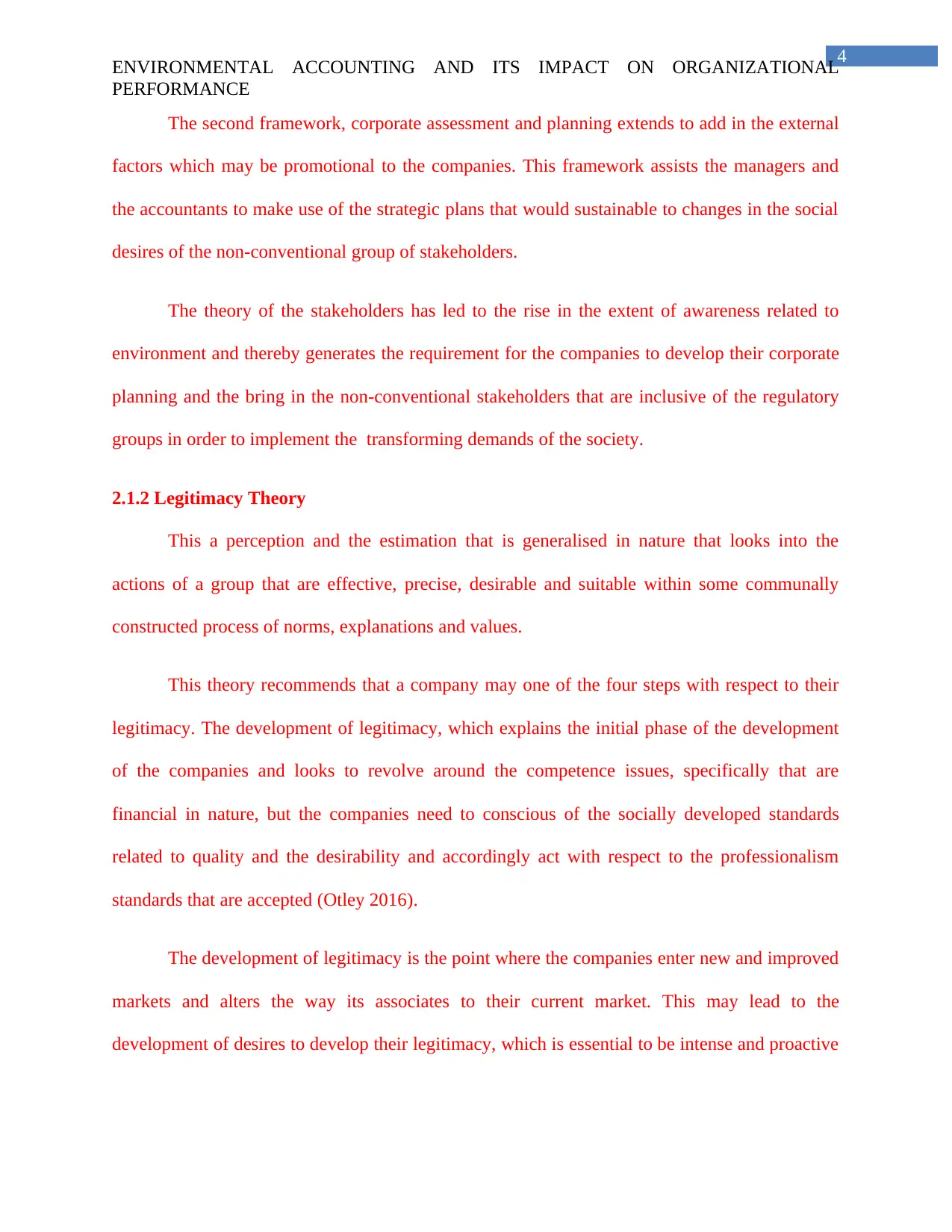
4
ENVIRONMENTAL ACCOUNTING AND ITS IMPACT ON ORGANIZATIONAL
PERFORMANCE
The second framework, corporate assessment and planning extends to add in the external
factors which may be promotional to the companies. This framework assists the managers and
the accountants to make use of the strategic plans that would sustainable to changes in the social
desires of the non-conventional group of stakeholders.
The theory of the stakeholders has led to the rise in the extent of awareness related to
environment and thereby generates the requirement for the companies to develop their corporate
planning and the bring in the non-conventional stakeholders that are inclusive of the regulatory
groups in order to implement the transforming demands of the society.
2.1.2 Legitimacy Theory
This a perception and the estimation that is generalised in nature that looks into the
actions of a group that are effective, precise, desirable and suitable within some communally
constructed process of norms, explanations and values.
This theory recommends that a company may one of the four steps with respect to their
legitimacy. The development of legitimacy, which explains the initial phase of the development
of the companies and looks to revolve around the competence issues, specifically that are
financial in nature, but the companies need to conscious of the socially developed standards
related to quality and the desirability and accordingly act with respect to the professionalism
standards that are accepted (Otley 2016).
The development of legitimacy is the point where the companies enter new and improved
markets and alters the way its associates to their current market. This may lead to the
development of desires to develop their legitimacy, which is essential to be intense and proactive
ENVIRONMENTAL ACCOUNTING AND ITS IMPACT ON ORGANIZATIONAL
PERFORMANCE
The second framework, corporate assessment and planning extends to add in the external
factors which may be promotional to the companies. This framework assists the managers and
the accountants to make use of the strategic plans that would sustainable to changes in the social
desires of the non-conventional group of stakeholders.
The theory of the stakeholders has led to the rise in the extent of awareness related to
environment and thereby generates the requirement for the companies to develop their corporate
planning and the bring in the non-conventional stakeholders that are inclusive of the regulatory
groups in order to implement the transforming demands of the society.
2.1.2 Legitimacy Theory
This a perception and the estimation that is generalised in nature that looks into the
actions of a group that are effective, precise, desirable and suitable within some communally
constructed process of norms, explanations and values.
This theory recommends that a company may one of the four steps with respect to their
legitimacy. The development of legitimacy, which explains the initial phase of the development
of the companies and looks to revolve around the competence issues, specifically that are
financial in nature, but the companies need to conscious of the socially developed standards
related to quality and the desirability and accordingly act with respect to the professionalism
standards that are accepted (Otley 2016).
The development of legitimacy is the point where the companies enter new and improved
markets and alters the way its associates to their current market. This may lead to the
development of desires to develop their legitimacy, which is essential to be intense and proactive
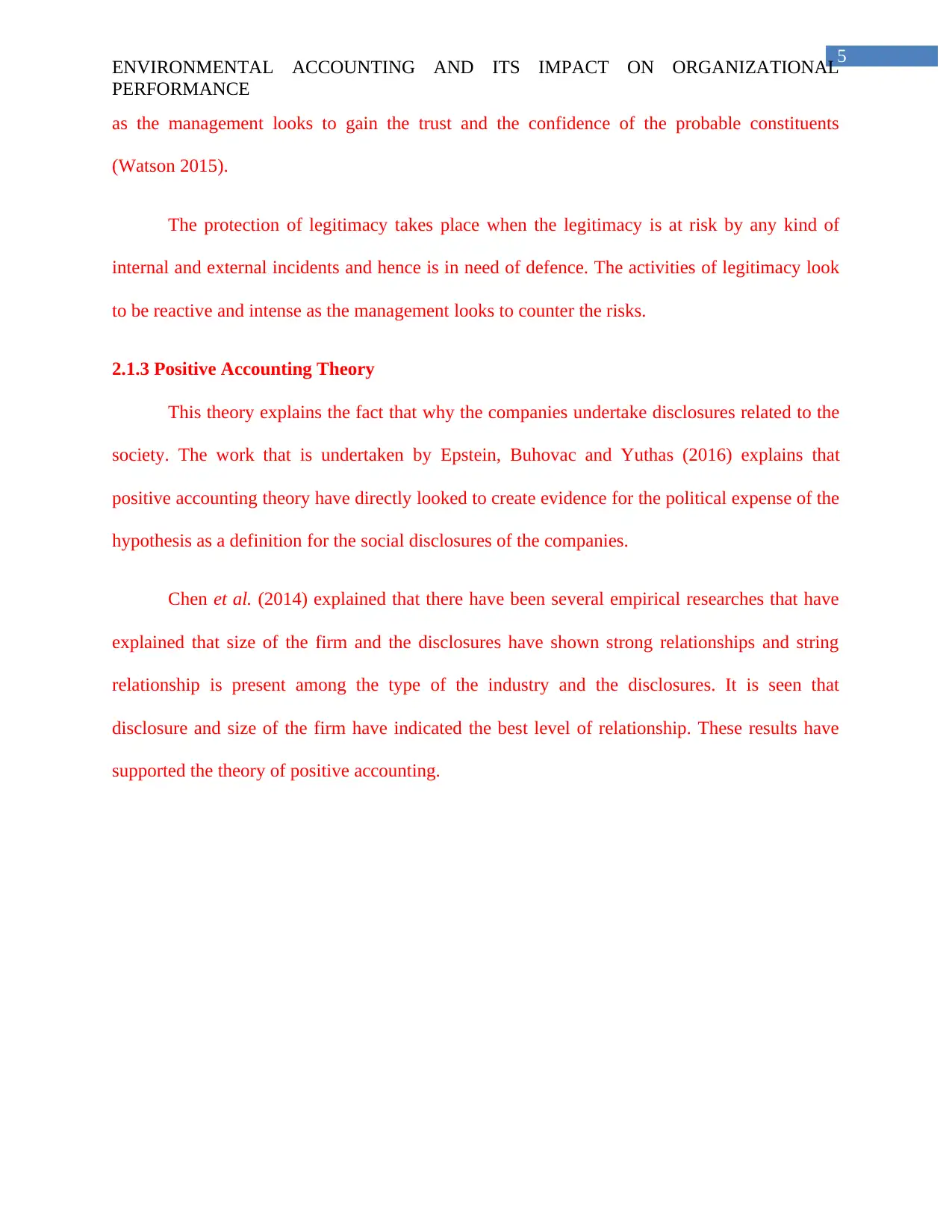
5
ENVIRONMENTAL ACCOUNTING AND ITS IMPACT ON ORGANIZATIONAL
PERFORMANCE
as the management looks to gain the trust and the confidence of the probable constituents
(Watson 2015).
The protection of legitimacy takes place when the legitimacy is at risk by any kind of
internal and external incidents and hence is in need of defence. The activities of legitimacy look
to be reactive and intense as the management looks to counter the risks.
2.1.3 Positive Accounting Theory
This theory explains the fact that why the companies undertake disclosures related to the
society. The work that is undertaken by Epstein, Buhovac and Yuthas (2016) explains that
positive accounting theory have directly looked to create evidence for the political expense of the
hypothesis as a definition for the social disclosures of the companies.
Chen et al. (2014) explained that there have been several empirical researches that have
explained that size of the firm and the disclosures have shown strong relationships and string
relationship is present among the type of the industry and the disclosures. It is seen that
disclosure and size of the firm have indicated the best level of relationship. These results have
supported the theory of positive accounting.
ENVIRONMENTAL ACCOUNTING AND ITS IMPACT ON ORGANIZATIONAL
PERFORMANCE
as the management looks to gain the trust and the confidence of the probable constituents
(Watson 2015).
The protection of legitimacy takes place when the legitimacy is at risk by any kind of
internal and external incidents and hence is in need of defence. The activities of legitimacy look
to be reactive and intense as the management looks to counter the risks.
2.1.3 Positive Accounting Theory
This theory explains the fact that why the companies undertake disclosures related to the
society. The work that is undertaken by Epstein, Buhovac and Yuthas (2016) explains that
positive accounting theory have directly looked to create evidence for the political expense of the
hypothesis as a definition for the social disclosures of the companies.
Chen et al. (2014) explained that there have been several empirical researches that have
explained that size of the firm and the disclosures have shown strong relationships and string
relationship is present among the type of the industry and the disclosures. It is seen that
disclosure and size of the firm have indicated the best level of relationship. These results have
supported the theory of positive accounting.
⊘ This is a preview!⊘
Do you want full access?
Subscribe today to unlock all pages.

Trusted by 1+ million students worldwide
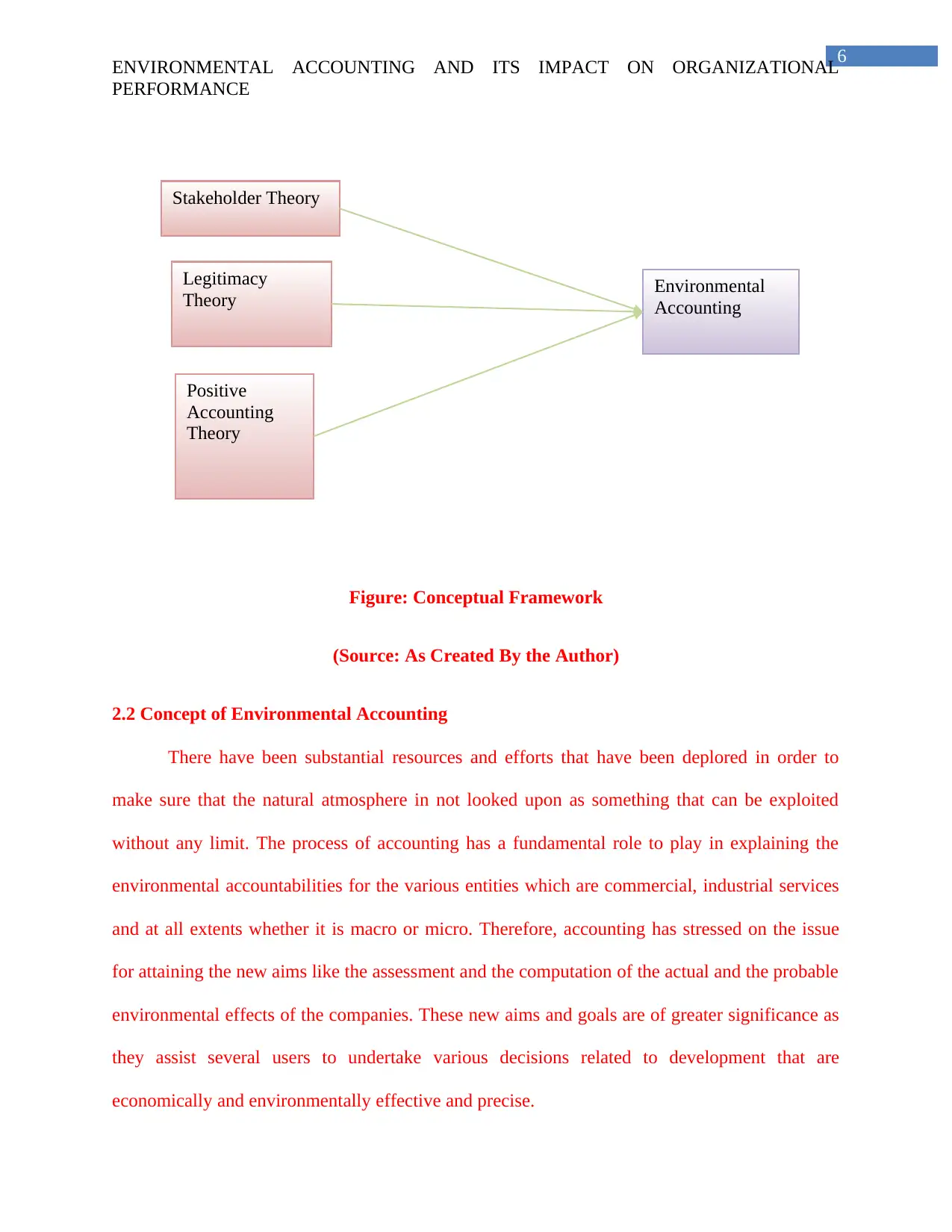
6
Stakeholder Theory
Legitimacy
Theory
Positive
Accounting
Theory
Environmental
Accounting
ENVIRONMENTAL ACCOUNTING AND ITS IMPACT ON ORGANIZATIONAL
PERFORMANCE
Figure: Conceptual Framework
(Source: As Created By the Author)
2.2 Concept of Environmental Accounting
There have been substantial resources and efforts that have been deplored in order to
make sure that the natural atmosphere in not looked upon as something that can be exploited
without any limit. The process of accounting has a fundamental role to play in explaining the
environmental accountabilities for the various entities which are commercial, industrial services
and at all extents whether it is macro or micro. Therefore, accounting has stressed on the issue
for attaining the new aims like the assessment and the computation of the actual and the probable
environmental effects of the companies. These new aims and goals are of greater significance as
they assist several users to undertake various decisions related to development that are
economically and environmentally effective and precise.
Stakeholder Theory
Legitimacy
Theory
Positive
Accounting
Theory
Environmental
Accounting
ENVIRONMENTAL ACCOUNTING AND ITS IMPACT ON ORGANIZATIONAL
PERFORMANCE
Figure: Conceptual Framework
(Source: As Created By the Author)
2.2 Concept of Environmental Accounting
There have been substantial resources and efforts that have been deplored in order to
make sure that the natural atmosphere in not looked upon as something that can be exploited
without any limit. The process of accounting has a fundamental role to play in explaining the
environmental accountabilities for the various entities which are commercial, industrial services
and at all extents whether it is macro or micro. Therefore, accounting has stressed on the issue
for attaining the new aims like the assessment and the computation of the actual and the probable
environmental effects of the companies. These new aims and goals are of greater significance as
they assist several users to undertake various decisions related to development that are
economically and environmentally effective and precise.
Paraphrase This Document
Need a fresh take? Get an instant paraphrase of this document with our AI Paraphraser
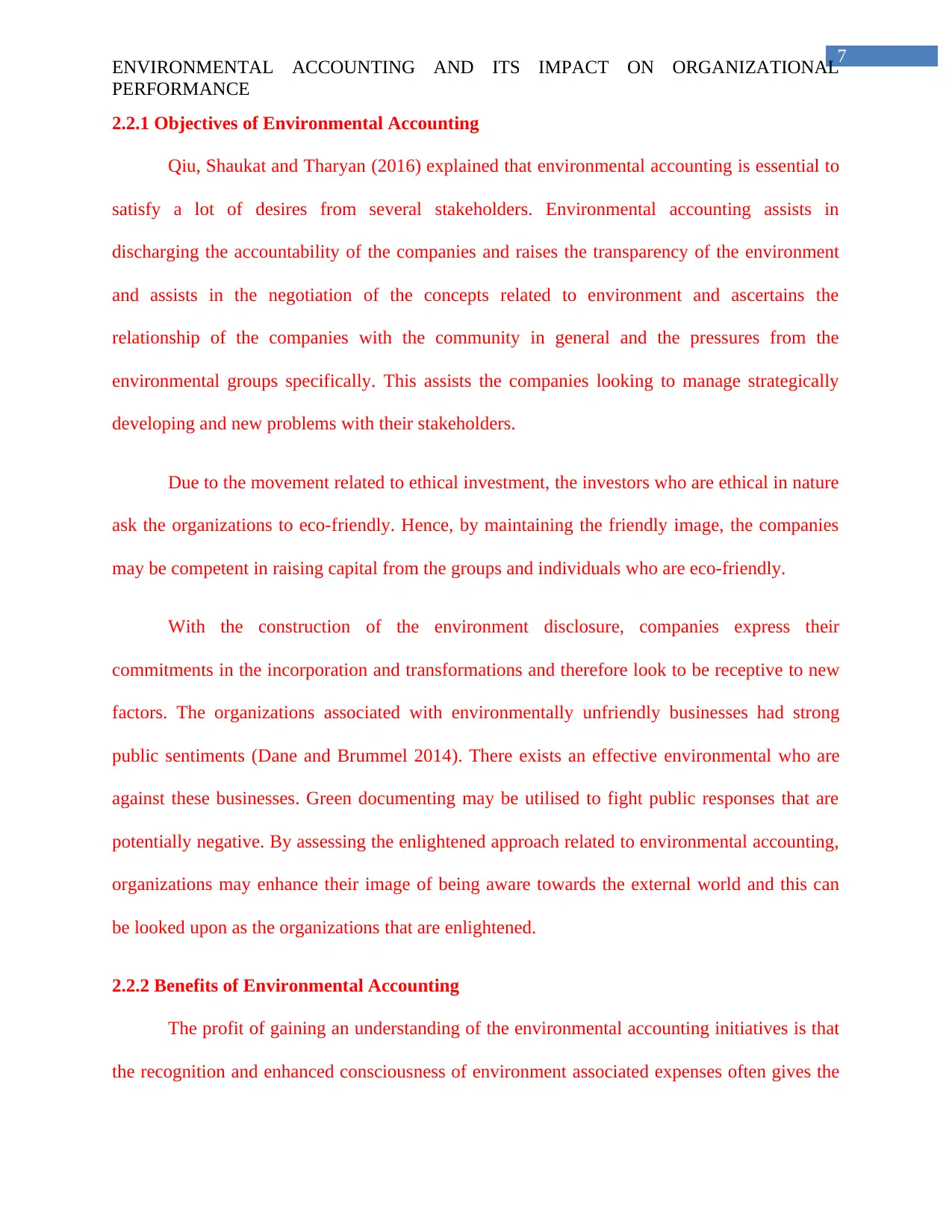
7
ENVIRONMENTAL ACCOUNTING AND ITS IMPACT ON ORGANIZATIONAL
PERFORMANCE
2.2.1 Objectives of Environmental Accounting
Qiu, Shaukat and Tharyan (2016) explained that environmental accounting is essential to
satisfy a lot of desires from several stakeholders. Environmental accounting assists in
discharging the accountability of the companies and raises the transparency of the environment
and assists in the negotiation of the concepts related to environment and ascertains the
relationship of the companies with the community in general and the pressures from the
environmental groups specifically. This assists the companies looking to manage strategically
developing and new problems with their stakeholders.
Due to the movement related to ethical investment, the investors who are ethical in nature
ask the organizations to eco-friendly. Hence, by maintaining the friendly image, the companies
may be competent in raising capital from the groups and individuals who are eco-friendly.
With the construction of the environment disclosure, companies express their
commitments in the incorporation and transformations and therefore look to be receptive to new
factors. The organizations associated with environmentally unfriendly businesses had strong
public sentiments (Dane and Brummel 2014). There exists an effective environmental who are
against these businesses. Green documenting may be utilised to fight public responses that are
potentially negative. By assessing the enlightened approach related to environmental accounting,
organizations may enhance their image of being aware towards the external world and this can
be looked upon as the organizations that are enlightened.
2.2.2 Benefits of Environmental Accounting
The profit of gaining an understanding of the environmental accounting initiatives is that
the recognition and enhanced consciousness of environment associated expenses often gives the
ENVIRONMENTAL ACCOUNTING AND ITS IMPACT ON ORGANIZATIONAL
PERFORMANCE
2.2.1 Objectives of Environmental Accounting
Qiu, Shaukat and Tharyan (2016) explained that environmental accounting is essential to
satisfy a lot of desires from several stakeholders. Environmental accounting assists in
discharging the accountability of the companies and raises the transparency of the environment
and assists in the negotiation of the concepts related to environment and ascertains the
relationship of the companies with the community in general and the pressures from the
environmental groups specifically. This assists the companies looking to manage strategically
developing and new problems with their stakeholders.
Due to the movement related to ethical investment, the investors who are ethical in nature
ask the organizations to eco-friendly. Hence, by maintaining the friendly image, the companies
may be competent in raising capital from the groups and individuals who are eco-friendly.
With the construction of the environment disclosure, companies express their
commitments in the incorporation and transformations and therefore look to be receptive to new
factors. The organizations associated with environmentally unfriendly businesses had strong
public sentiments (Dane and Brummel 2014). There exists an effective environmental who are
against these businesses. Green documenting may be utilised to fight public responses that are
potentially negative. By assessing the enlightened approach related to environmental accounting,
organizations may enhance their image of being aware towards the external world and this can
be looked upon as the organizations that are enlightened.
2.2.2 Benefits of Environmental Accounting
The profit of gaining an understanding of the environmental accounting initiatives is that
the recognition and enhanced consciousness of environment associated expenses often gives the
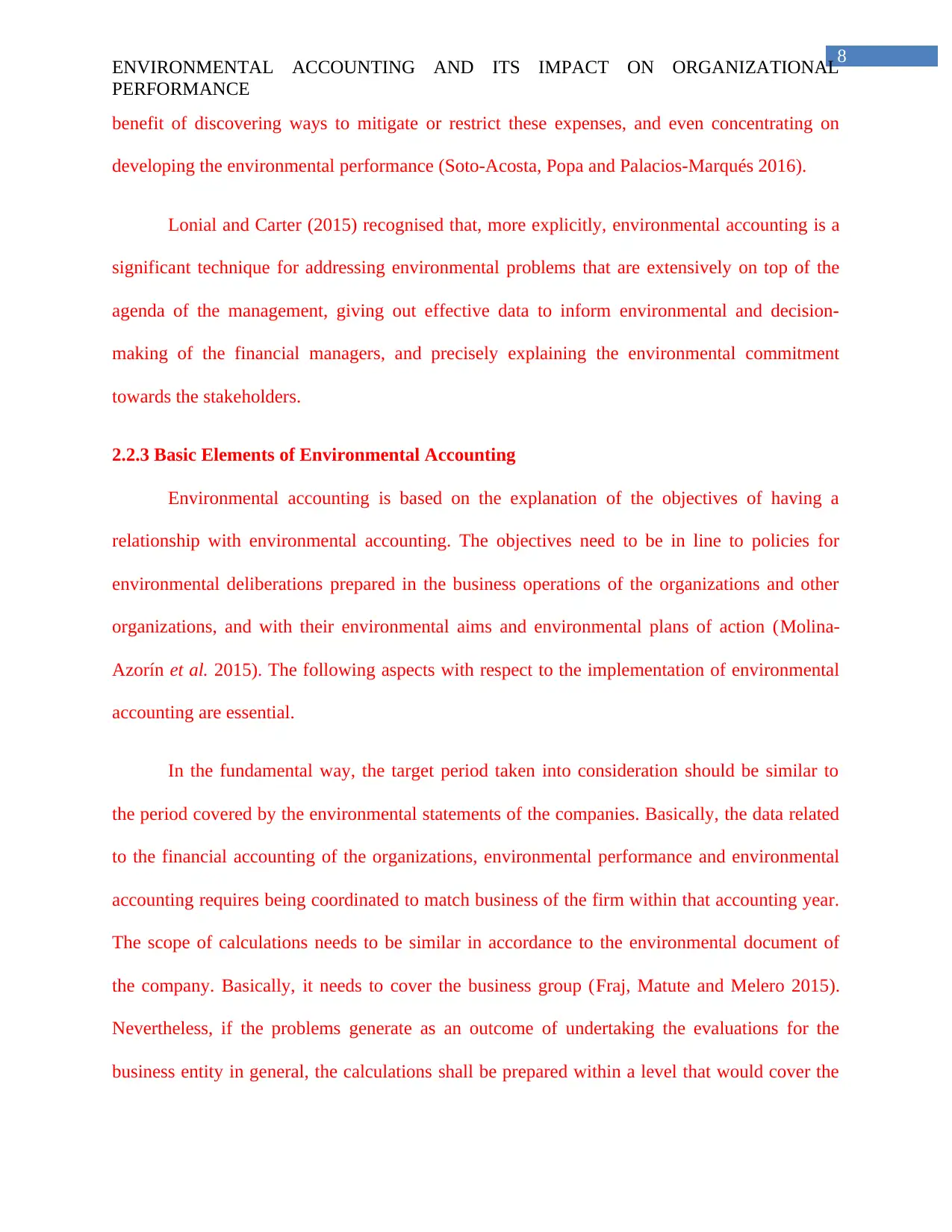
8
ENVIRONMENTAL ACCOUNTING AND ITS IMPACT ON ORGANIZATIONAL
PERFORMANCE
benefit of discovering ways to mitigate or restrict these expenses, and even concentrating on
developing the environmental performance (Soto-Acosta, Popa and Palacios-Marqués 2016).
Lonial and Carter (2015) recognised that, more explicitly, environmental accounting is a
significant technique for addressing environmental problems that are extensively on top of the
agenda of the management, giving out effective data to inform environmental and decision-
making of the financial managers, and precisely explaining the environmental commitment
towards the stakeholders.
2.2.3 Basic Elements of Environmental Accounting
Environmental accounting is based on the explanation of the objectives of having a
relationship with environmental accounting. The objectives need to be in line to policies for
environmental deliberations prepared in the business operations of the organizations and other
organizations, and with their environmental aims and environmental plans of action (Molina-
Azorín et al. 2015). The following aspects with respect to the implementation of environmental
accounting are essential.
In the fundamental way, the target period taken into consideration should be similar to
the period covered by the environmental statements of the companies. Basically, the data related
to the financial accounting of the organizations, environmental performance and environmental
accounting requires being coordinated to match business of the firm within that accounting year.
The scope of calculations needs to be similar in accordance to the environmental document of
the company. Basically, it needs to cover the business group (Fraj, Matute and Melero 2015).
Nevertheless, if the problems generate as an outcome of undertaking the evaluations for the
business entity in general, the calculations shall be prepared within a level that would cover the
ENVIRONMENTAL ACCOUNTING AND ITS IMPACT ON ORGANIZATIONAL
PERFORMANCE
benefit of discovering ways to mitigate or restrict these expenses, and even concentrating on
developing the environmental performance (Soto-Acosta, Popa and Palacios-Marqués 2016).
Lonial and Carter (2015) recognised that, more explicitly, environmental accounting is a
significant technique for addressing environmental problems that are extensively on top of the
agenda of the management, giving out effective data to inform environmental and decision-
making of the financial managers, and precisely explaining the environmental commitment
towards the stakeholders.
2.2.3 Basic Elements of Environmental Accounting
Environmental accounting is based on the explanation of the objectives of having a
relationship with environmental accounting. The objectives need to be in line to policies for
environmental deliberations prepared in the business operations of the organizations and other
organizations, and with their environmental aims and environmental plans of action (Molina-
Azorín et al. 2015). The following aspects with respect to the implementation of environmental
accounting are essential.
In the fundamental way, the target period taken into consideration should be similar to
the period covered by the environmental statements of the companies. Basically, the data related
to the financial accounting of the organizations, environmental performance and environmental
accounting requires being coordinated to match business of the firm within that accounting year.
The scope of calculations needs to be similar in accordance to the environmental document of
the company. Basically, it needs to cover the business group (Fraj, Matute and Melero 2015).
Nevertheless, if the problems generate as an outcome of undertaking the evaluations for the
business entity in general, the calculations shall be prepared within a level that would cover the
⊘ This is a preview!⊘
Do you want full access?
Subscribe today to unlock all pages.

Trusted by 1+ million students worldwide
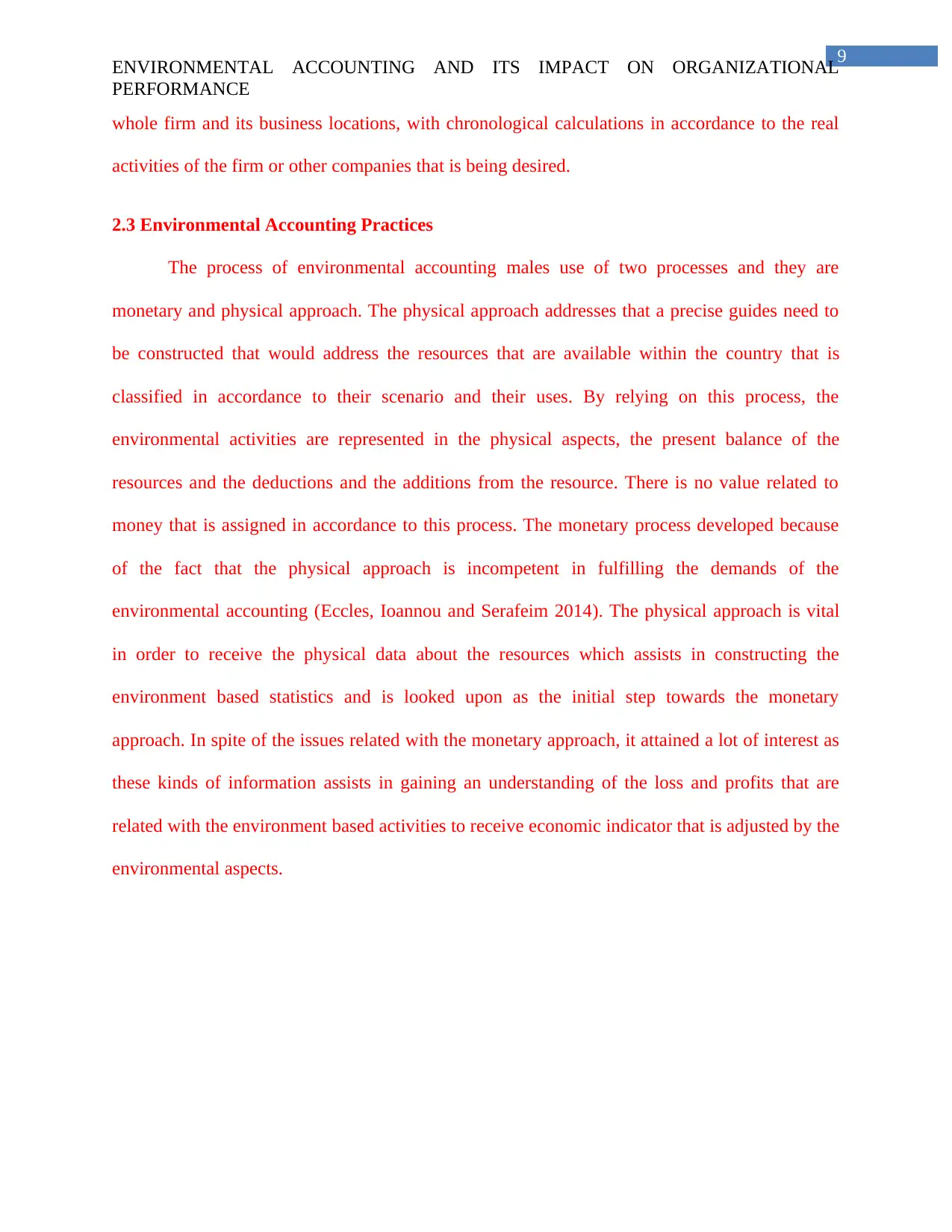
9
ENVIRONMENTAL ACCOUNTING AND ITS IMPACT ON ORGANIZATIONAL
PERFORMANCE
whole firm and its business locations, with chronological calculations in accordance to the real
activities of the firm or other companies that is being desired.
2.3 Environmental Accounting Practices
The process of environmental accounting males use of two processes and they are
monetary and physical approach. The physical approach addresses that a precise guides need to
be constructed that would address the resources that are available within the country that is
classified in accordance to their scenario and their uses. By relying on this process, the
environmental activities are represented in the physical aspects, the present balance of the
resources and the deductions and the additions from the resource. There is no value related to
money that is assigned in accordance to this process. The monetary process developed because
of the fact that the physical approach is incompetent in fulfilling the demands of the
environmental accounting (Eccles, Ioannou and Serafeim 2014). The physical approach is vital
in order to receive the physical data about the resources which assists in constructing the
environment based statistics and is looked upon as the initial step towards the monetary
approach. In spite of the issues related with the monetary approach, it attained a lot of interest as
these kinds of information assists in gaining an understanding of the loss and profits that are
related with the environment based activities to receive economic indicator that is adjusted by the
environmental aspects.
ENVIRONMENTAL ACCOUNTING AND ITS IMPACT ON ORGANIZATIONAL
PERFORMANCE
whole firm and its business locations, with chronological calculations in accordance to the real
activities of the firm or other companies that is being desired.
2.3 Environmental Accounting Practices
The process of environmental accounting males use of two processes and they are
monetary and physical approach. The physical approach addresses that a precise guides need to
be constructed that would address the resources that are available within the country that is
classified in accordance to their scenario and their uses. By relying on this process, the
environmental activities are represented in the physical aspects, the present balance of the
resources and the deductions and the additions from the resource. There is no value related to
money that is assigned in accordance to this process. The monetary process developed because
of the fact that the physical approach is incompetent in fulfilling the demands of the
environmental accounting (Eccles, Ioannou and Serafeim 2014). The physical approach is vital
in order to receive the physical data about the resources which assists in constructing the
environment based statistics and is looked upon as the initial step towards the monetary
approach. In spite of the issues related with the monetary approach, it attained a lot of interest as
these kinds of information assists in gaining an understanding of the loss and profits that are
related with the environment based activities to receive economic indicator that is adjusted by the
environmental aspects.
Paraphrase This Document
Need a fresh take? Get an instant paraphrase of this document with our AI Paraphraser
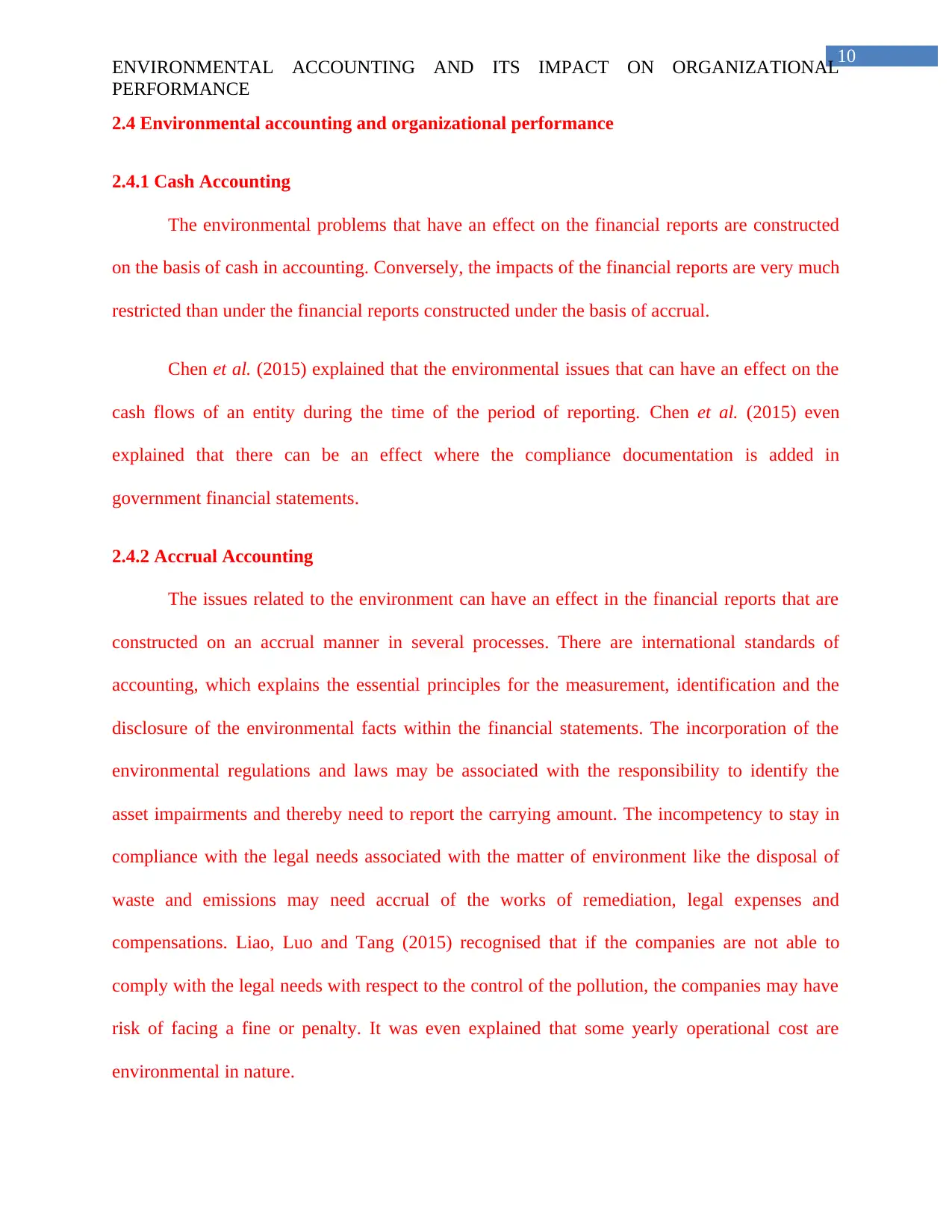
10
ENVIRONMENTAL ACCOUNTING AND ITS IMPACT ON ORGANIZATIONAL
PERFORMANCE
2.4 Environmental accounting and organizational performance
2.4.1 Cash Accounting
The environmental problems that have an effect on the financial reports are constructed
on the basis of cash in accounting. Conversely, the impacts of the financial reports are very much
restricted than under the financial reports constructed under the basis of accrual.
Chen et al. (2015) explained that the environmental issues that can have an effect on the
cash flows of an entity during the time of the period of reporting. Chen et al. (2015) even
explained that there can be an effect where the compliance documentation is added in
government financial statements.
2.4.2 Accrual Accounting
The issues related to the environment can have an effect in the financial reports that are
constructed on an accrual manner in several processes. There are international standards of
accounting, which explains the essential principles for the measurement, identification and the
disclosure of the environmental facts within the financial statements. The incorporation of the
environmental regulations and laws may be associated with the responsibility to identify the
asset impairments and thereby need to report the carrying amount. The incompetency to stay in
compliance with the legal needs associated with the matter of environment like the disposal of
waste and emissions may need accrual of the works of remediation, legal expenses and
compensations. Liao, Luo and Tang (2015) recognised that if the companies are not able to
comply with the legal needs with respect to the control of the pollution, the companies may have
risk of facing a fine or penalty. It was even explained that some yearly operational cost are
environmental in nature.
ENVIRONMENTAL ACCOUNTING AND ITS IMPACT ON ORGANIZATIONAL
PERFORMANCE
2.4 Environmental accounting and organizational performance
2.4.1 Cash Accounting
The environmental problems that have an effect on the financial reports are constructed
on the basis of cash in accounting. Conversely, the impacts of the financial reports are very much
restricted than under the financial reports constructed under the basis of accrual.
Chen et al. (2015) explained that the environmental issues that can have an effect on the
cash flows of an entity during the time of the period of reporting. Chen et al. (2015) even
explained that there can be an effect where the compliance documentation is added in
government financial statements.
2.4.2 Accrual Accounting
The issues related to the environment can have an effect in the financial reports that are
constructed on an accrual manner in several processes. There are international standards of
accounting, which explains the essential principles for the measurement, identification and the
disclosure of the environmental facts within the financial statements. The incorporation of the
environmental regulations and laws may be associated with the responsibility to identify the
asset impairments and thereby need to report the carrying amount. The incompetency to stay in
compliance with the legal needs associated with the matter of environment like the disposal of
waste and emissions may need accrual of the works of remediation, legal expenses and
compensations. Liao, Luo and Tang (2015) recognised that if the companies are not able to
comply with the legal needs with respect to the control of the pollution, the companies may have
risk of facing a fine or penalty. It was even explained that some yearly operational cost are
environmental in nature.
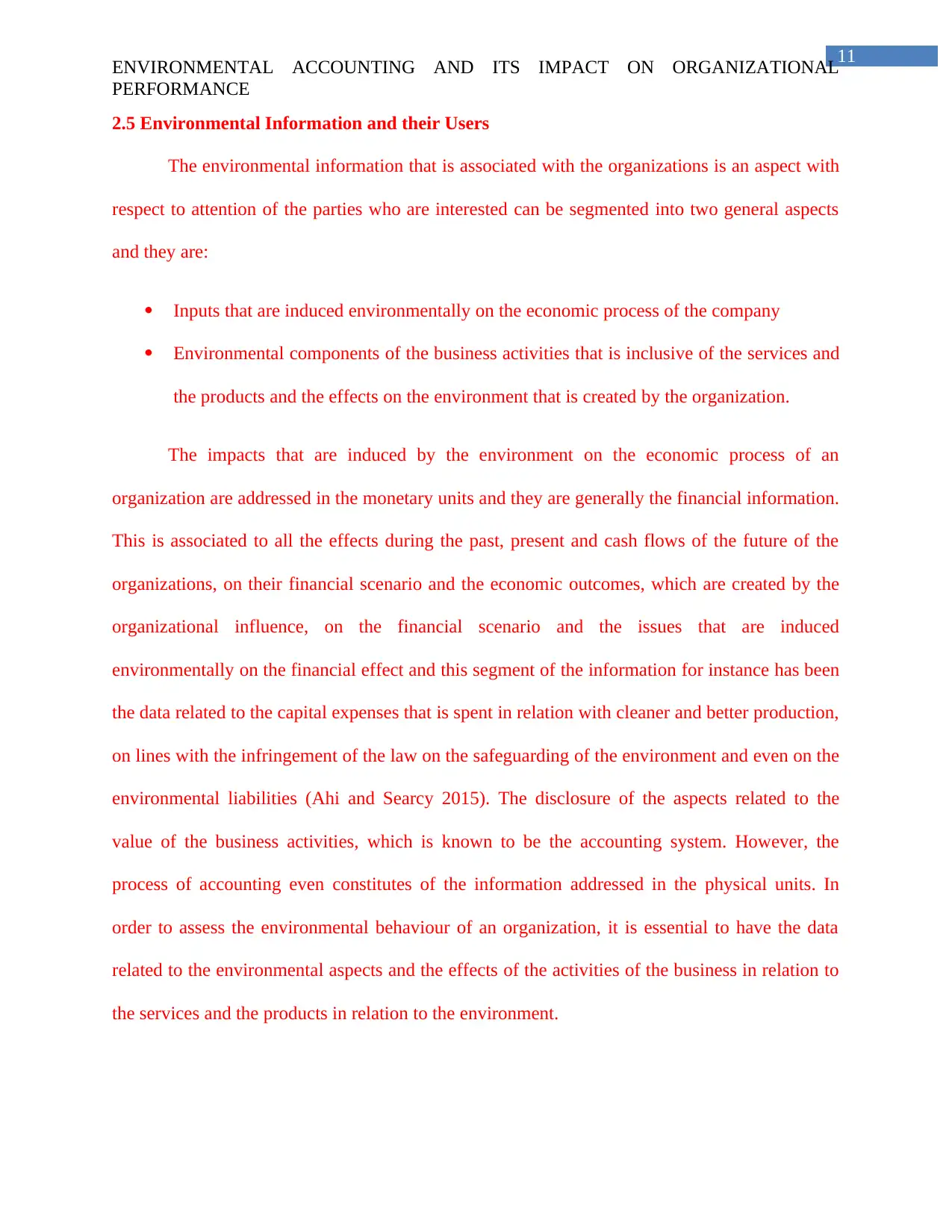
11
ENVIRONMENTAL ACCOUNTING AND ITS IMPACT ON ORGANIZATIONAL
PERFORMANCE
2.5 Environmental Information and their Users
The environmental information that is associated with the organizations is an aspect with
respect to attention of the parties who are interested can be segmented into two general aspects
and they are:
Inputs that are induced environmentally on the economic process of the company
Environmental components of the business activities that is inclusive of the services and
the products and the effects on the environment that is created by the organization.
The impacts that are induced by the environment on the economic process of an
organization are addressed in the monetary units and they are generally the financial information.
This is associated to all the effects during the past, present and cash flows of the future of the
organizations, on their financial scenario and the economic outcomes, which are created by the
organizational influence, on the financial scenario and the issues that are induced
environmentally on the financial effect and this segment of the information for instance has been
the data related to the capital expenses that is spent in relation with cleaner and better production,
on lines with the infringement of the law on the safeguarding of the environment and even on the
environmental liabilities (Ahi and Searcy 2015). The disclosure of the aspects related to the
value of the business activities, which is known to be the accounting system. However, the
process of accounting even constitutes of the information addressed in the physical units. In
order to assess the environmental behaviour of an organization, it is essential to have the data
related to the environmental aspects and the effects of the activities of the business in relation to
the services and the products in relation to the environment.
ENVIRONMENTAL ACCOUNTING AND ITS IMPACT ON ORGANIZATIONAL
PERFORMANCE
2.5 Environmental Information and their Users
The environmental information that is associated with the organizations is an aspect with
respect to attention of the parties who are interested can be segmented into two general aspects
and they are:
Inputs that are induced environmentally on the economic process of the company
Environmental components of the business activities that is inclusive of the services and
the products and the effects on the environment that is created by the organization.
The impacts that are induced by the environment on the economic process of an
organization are addressed in the monetary units and they are generally the financial information.
This is associated to all the effects during the past, present and cash flows of the future of the
organizations, on their financial scenario and the economic outcomes, which are created by the
organizational influence, on the financial scenario and the issues that are induced
environmentally on the financial effect and this segment of the information for instance has been
the data related to the capital expenses that is spent in relation with cleaner and better production,
on lines with the infringement of the law on the safeguarding of the environment and even on the
environmental liabilities (Ahi and Searcy 2015). The disclosure of the aspects related to the
value of the business activities, which is known to be the accounting system. However, the
process of accounting even constitutes of the information addressed in the physical units. In
order to assess the environmental behaviour of an organization, it is essential to have the data
related to the environmental aspects and the effects of the activities of the business in relation to
the services and the products in relation to the environment.
⊘ This is a preview!⊘
Do you want full access?
Subscribe today to unlock all pages.

Trusted by 1+ million students worldwide
1 out of 43
Related Documents
Your All-in-One AI-Powered Toolkit for Academic Success.
+13062052269
info@desklib.com
Available 24*7 on WhatsApp / Email
![[object Object]](/_next/static/media/star-bottom.7253800d.svg)
Unlock your academic potential
Copyright © 2020–2026 A2Z Services. All Rights Reserved. Developed and managed by ZUCOL.





